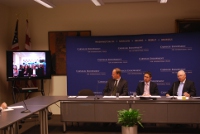Registration
Thank you!
You will receive an email confirming your registration.
IMGXYZ3234IMGZYXCarnegie hosted a video-conference with Oksana Gryshchenko, an advisor to the Ukrainian Ministry of Fuel and Energy; Yuriy Korolchuk, of the Institute for Energy Studies; Peter Dohlman from the International Monetary Fund; and Carnegie’s Adnan Vatansever. The panelists examined energy efficiency and energy security in Ukrainian policy. The event was moderated by Korolchuk in Kiev and Carnegie’s Ambassador James F. Collins in Washington.
Ukraine’s Energy Standing
- Relationship with Russia: Historically, natural gas prices in Ukraine have been low, stimulating overconsumption and over-reliance on natural gas, underinvestment in new technology and infrastructure, and lack of transparency, explained Vatansever.
- Ukraine’s Natural Gas Consumption: Natural gas consumption in Ukraine constitutes more than one-third of the total primary energy supply, Vatansever added. In contrast, natural gas constitutes about one-quarter of total primary energy supply in the EU. Furthermore, last year, Ukraine was the second largest importer of natural gas from Russia after Germany.
- Ukraine’s Energy Efficiency Standing: Given Ukraine’s strong reliance on natural gas consumption and the necessity to buy natural gas abroad, Ukraine’s energy intensity measures are almost four times higher than those of Germany, two times higher than the European Union’s average, and higher than most countries in the former Soviet Union, except Uzbekistan and Turkmenistan which possess substantial gas reserves, Vatansever explained.
- Recent Improvements: Energy efficiency measures have improved due to recent structural changes in the economy and impressive economic growth in the decade before the economic downturn of 2009, said Vatansever. However, he argued that Ukraine will need to develop actual energy efficiency policies to increase its energy efficiency standing.
Key Energy Challenges
- Dependence on Russia: As a gas-importing country, Ukraine is fully dependent on Russian supplies of gas, said Gryshchenko. This dependence on a single source for its gas imports poses a risk to Ukraine’s energy security, she argued.
- Domestic Problems: Ukraine also suffers from a lack of gas metering, significant natural gas losses during transportation, lack of clear rules regarding non-payment for gas by residential consumers, and a presence of subsidized prices that create a disincentive for investing in old heating infrastructure, added Vatansever.
- Domestic Fiscal Situation: Ukraine’s residents pay only 20-25 percent of the cost of importing gas from Russia, while the rest is borne by the government, generating immense fiscal pressures on the government, stated Dohlman. As high as 4.5 percent of the country’s GDP is geared toward paying off accumulated debts of Naftogaz, Ukraine’s leading oil and gas company. This is financed by budget transfers, recapitalization, bond issuance, transit fees, and borrowing said Dohlman, creating an enormous fiscal drain on the government.
Ways to Counter Risk
- Diversify Supply of Gas: Ukraine could find alternative sources for gas imports, such as Turkmenistan and Azerbaijan, to counter energy security risks posed by the country’s reliance on Russian gas, Vatansever said. However, Turkmen gas coming through Gazprom’s pipeline cannot adequately alleviate Ukraine’s energy security concerns. Likewise, proposed LNG imports from Azerbaijan will be very costly and will have to compete with several more advanced projects targeting Azeri gas.
- Increase Domestic Gas Production: Ukraine has no alternative but to increase energy production within the country, argued Gryshchenko.
- Replacing Natural Gas with Other Fuels: Ukraine could explore potential increases in coal and nuclear power, although substituting coal for gas would not be a viable option in the long-term if Ukraine wants to integrate with the Europe Union, argued Vatansever. A greater emphasis on renewable energy is worth consideration given Ukraine’s low starting point.
- Non-traditional Gas: Possible production of shale gas within Ukraine as well as imports of liquefied natural gas could put pressure on Russia to decrease the prices it currently charges for natural gas to Ukraine, argued Korolchuk.
Energy Efficiency Measures
Energy efficiency policies offer politically neutral options to help Ukraine’s energy security, argued Vatansever.
- Possible policies: Energy efficiency measures include major municipal services reform, investment in heat generation and shifting toward newer technologies by Ukrainian chemical, steel, iron and cement producers, explained Vatansever. In addition, clear laws are needed to address non-payment for gas by residential consumers, who constitute around 25 percent of overall gas consumption in the country.
- Effects: The effects of energy efficiency strategies have the potential to strengthen Ukraine’s energy security standing. For example, tariff reform would increase investments into domestic gas and alternative energy production, and help the fiscal deficit problem in Ukraine, said Vatansever. Energy efficiency measures would also reduce carbon emissions in the long term, he argued.
- Fiscal Deficit: Ukraine must increase residential gas prices, argued Dohlman. Such a move would ameliorate the fiscal deficit situation and would signal that Ukraine is serious about reform, he contended.
- Protect the Poorest Segment of the Population: The governmental benefits policies are not well targeted, with the top 20 percent of income earners receiving 25-30 percent of benefits, and the poorest 25 percent of the population receiving only about 8 percent of benefits, said Dohlman. While increasing residential gas prices, the Ukrainian government must also protect the poorest segment of the population from bearing the brunt of the cost, he concluded.
Political ReformEconomyClimate ChangeSecurityForeign PolicyCentral AsiaCaucasusRussiaEastern EuropeUkraineWestern EuropeNorth America
